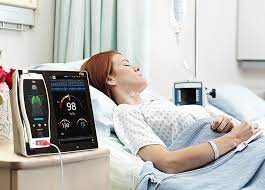28 March 2023 | Tuesday | News

Image Source : Public Domain
The implementation of this respiratory monitoring program in a large health system is a vital step in helping to ensure patients are getting the resources they need to develop informed treatment plans with their doctors. Teva and Rimidi continue to look for ways to expand this respiratory monitoring program by partnering with additional health systems in an effort to reduce high costs, lower hospitalizations and improve asthma management.
“Teva aims to be a leader in fusing technology and healthcare in order to help patients and their doctors more easily manage their treatment plans. Through collaborations with partners like Rimidi, we hope to improve the patient continuum of care, leading to a more cost-effective healthcare system,” said Manny Montalvo, Senior Vice President, Head of Digital Health & Innovation at Teva. “More than 34 million Americans live with a chronic lung disease, and approximately 25 million people in the U.S. currently have asthma.1 We’re energized by the potential of collaborations like this to drive meaningful differences in how asthma is managed and treated, with the collective vision of one day predicting asthma attacks before they occur.”
Through this collaboration, DOHC has identified patients with respiratory conditions indicated for treatment with one or more of the products in Teva’s Digihaler family of inhalers, and who are appropriate candidates for enrollment via the Rimidi platform. Data from Teva’s Digihaler System will be available through Rimidi’s Respiratory Module, which is designed to give providers a more complete view of the patient to help guide treatment decisions for those with respiratory diseases, such as chronic obstructive pulmonary disease (COPD) or asthma.
“The ability to have a streamlined, comprehensive view of a patient’s health condition allows for more efficient and personalized management,” said Lucienne Ide, MD, PhD, Founder and CEO of Rimidi. “Rimidi’s Respiratory Module incorporates clinical decision support tools to help clinicians understand potential reasons behind a patient’s uncontrolled asthma, such as not taking their medication or not taking it properly. These factors are fundamental to achieving good asthma control.”
Integrating data from the smart inhalers into the clinician’s electronic health records through the Respiratory Module can help support the management of COPD and asthma. Longer term, outcomes from DOHC’s initial patient cohort will provide valuable insights to inform the use of data from Teva’s Digihaler System and the module in U.S. health systems. The platform can be used to monitor and manage large populations by a network of health systems, capturing objective and actionable data for asthma patients. The goal is to assess how this approach can help address high costs, lower hospitalizations and improve asthma management.
© 2026 Biopharma Boardroom. All Rights Reserved.